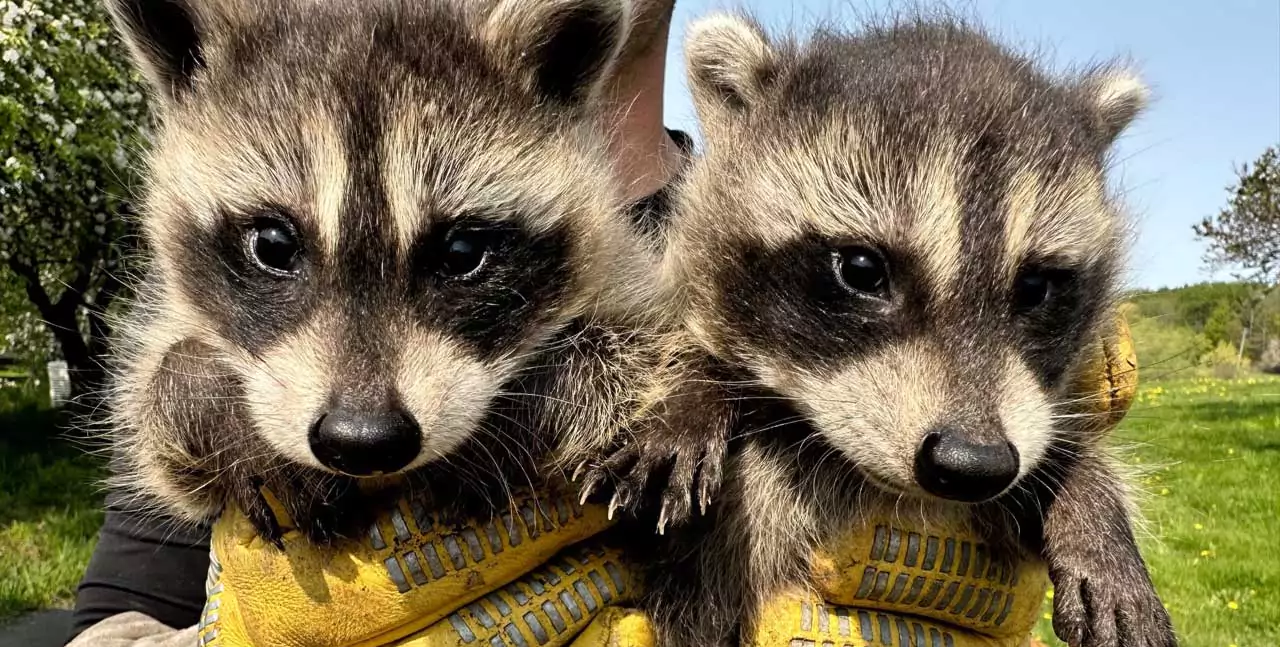Despite baby raccoons being nicknamed “trash pandas”, they can look cute and harmless!
However, raccoons are known for destroying gardens, creating messes, and nesting in residential spaces. So, are baby raccoons dangerous or not?
They can be — and here’s how you can help.

How Dangerous Are Baby Raccoons?
One of the biggest concerns about baby raccoons is the diseases they might carry.
Rabies
Rabies carried from any animal isn’t something to take lightly.
If you get bitten by an infected raccoon, you’re at great risk of being infected with rabies. Baby raccoons aren’t born with rabies, but can be exposed to it at birth by their mother as she grooms them.
Rabies is only passed on by the salivary glands, which is why getting bitten by an animal can be detrimental to your health. Similarly, your pets are also at risk, even without direct contact with raccoons. An infected raccoon drinking from a shared water dish can easily transmit rabies to your dog or cat. Rabies can cause depression, apathy, anorexia, discharge from the eyes and nose, trouble breathing, lack of coordination, paralysis, aggression, and abnormal behavior. Rabies is almost always fatal for humans.
Canine Distemper
Canine distemper is a highly contagious viral disease that isn’t just found in dogs! It can infect and be passed on from all sorts of critters, including raccoons.
It can cause respiratory issues, stomach troubles, and neurological symptoms. And unlike rabies, it’s not merely passed on through a bite. It can infect you through direct contact with infected baby raccoons or their bodily fluids.
Raccoon Roundworm (Baylisascaris Procyonis)
Raccoon roundworm is a parasite that lives inside raccoon intestines. Its eggs can survive in the environment for years, and if they find their way to you, you could suffer from nausea, liver enlargement, lack of coordination, or even blindness or a coma.
Giardiasis
This parasitic infection is caused by a sneaky little protozoan called Giardia duodenalis, which is found in raccoon poop. If that poop contaminates your water or food, you can suffer from gastrointestinal issues.
Leptospirosis
This is a bacterial disease that can affect humans and, yes, raccoons.
Infected baby raccoons can spread the bacteria through their urine, contaminating water and soil. If you come into contact with that contaminated stuff, you're at risk for flu-like symptoms.
Bottom line: steer clear of raccoon pee puddles!
Salmonellosis
This bacterial infection is caused by different strains of Salmonella bacteria, and you guessed it - raccoons can carry it too.
These critters can spread Salmonella through their feces, which means your food and water sources might not be as safe as you think.
Feeling queasy? You might be if you ingest some of that contaminated stuff. We're talking diarrhea, fever, and abdominal cramps. Not exactly a picnic in the park, huh? So, keep your hands clean and your food prep area raccoon-free!
So, are baby raccoons dangerous? To be safe, always assume they’re carrying a disease and exercise extra precaution when they're on your property.
How to Prevent Raccoons From Coming to Your Property
Homeowners will usually find baby raccoons in attics, under the deck, in sheds, gardens, garbage areas, and on rooftops. As cute as they are, baby raccoons should not be hanging around your property. Here’s how you can prevent them from being in your space (and staying out for good):
Secure Garbage & Compost Bins
Lock down those garbage and compost bins. Invest in bins with tightly sealed lids, or go the extra mile with animal-proof bins.
If you're feeling DIY-savvy, you can try to use bungee cords or locks as an interim solution or if you find baby raccoons are still finding their way into your garbage. Aside from locking them up, stash them away in enclosed areas like sheds or garages, especially when the sun goes down, to prevent raccoons from accessing them.
Remove Food Sources
Next up, let's talk about removing temptation. Don’t leave pet food or birdseed out in the open, because your raccoons may risk the health of not just you, but your pets, too.
You’ll also want to keep your outdoor spaces tidy by cleaning up fallen fruits and nuts from trees. When it's grilling season, make sure to give those barbecue grills a good scrub and tuck them away in a secure spot when you're done.
Seal Entry Points to Your Home
Start by giving your home a once-over. Check for any sneaky gaps or openings that raccoons could use as their own personal doorways.
Also check for cracks in your foundation, damaged vents or screens, and chimney caps.
Covering openings around decks, sheds, and crawl spaces will make it even harder for raccoons to find a way in.
Install Motion-Activated Lights
Motion-activated lights are a good first try at a natural raccoon repellent for your property.
Position these lights strategically around your property, focusing on areas where raccoons are likely to hang out, like near garbage bins or entry points.
Fence Off Gardens
Put up some sturdy fencing around your vegetable gardens, fruit trees, and ornamental plants.
Make sure that the fence goes deep — either completely underground or secured at the base — to stop raccoons from digging their way in.
Remove Potential Shelter
Trim back branches or vegetation that could serve as raccoon highways to your roof or attic. You should also clear brushes and woodpiles, to not create cozy hiding spots for raccoons.
Call Up Hawkeye For Simple Raccoon Baby Removal
When all else fails, reach out to a professional wildlife removal service like Hawkeye for some expert assistance. We’ll assess the situation, trap and remove those raccoons (and their babies), and even suggest some preventive measures to keep them from coming back.
Word of advice: there’s a reason you’re asking “Are baby raccoons dangerous?” — so leave the raccoon wrangling to the experts!
Frequently Asked Questions: How Dangerous Are Baby Raccoons?
Have questions beyond “Are baby raccoons dangerous?” We've got answers.
Are raccoon babies dangerous?
Raccoon babies, also known as kits, aren't usually dangerous on their own, but just like their grown-up counterparts, they can carry diseases. This is why it’s always best to keep your distance and avoid handling or approaching them.
This is especially important because mother raccoons are protective over their babies. If she thinks they’re in danger, she won’t hesitate to defend them by trying to injure you.
When do raccoons have babies?
These furry critters typically welcome their little ones into the world in early spring primarily in April and May.
Do all raccoon babies have rabies?
In other words, are all raccoon babies dangerous? Let's clear this up: not every raccoon baby is carrying rabies. But there’s really no way for you to tell. It’s better to be safe than sorry!
Where do you find baby raccoons?
Baby raccoons are usually hanging around in dens tucked away in tree cavities, hollow logs, or underground burrows. They’ll also try to hide inside your home for extra protection from predators, so make sure you have animal control services on-call to protect you and your family from baby raccoons!














